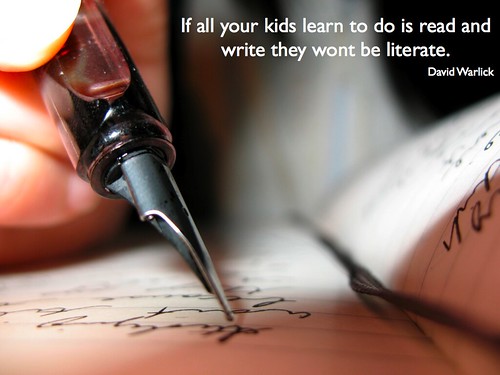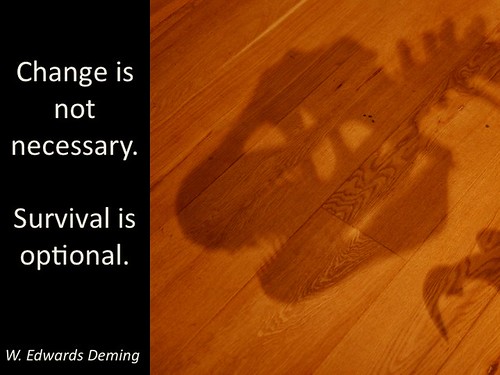
Photo courtesy of Darren Kuropatwa on Flickr in the group Great quotes about learning and change
Debates about whether reading and writing are going to suffer in the digital age open up opportunities for reflection and discussion. I was interested to read the Smithsonian article Reading in a whole new way about the way that reading and writing have changed and how they will continue to change.
Today some 4.5 billion digital screens illuminate our lives. Words have migrated from wood pulp to pixels on computers, phones, laptops, game consoles, televisions, billboards and tablets. Letters are no longer fixed in black ink on paper, but flitter on a glass surface in a rainbow of colors as fast as our eyes can blink. Screens fill our pockets, briefcases, dashboards, living room walls and the sides of buildings. They sit in front of us when we work—regardless of what we do. We are now people of the screen. And of course, these newly ubiquitous screens have changed how we read and write.
What really interests me is the change in the way the mind works with online reading, and I think it’s very well expressed here:
Books were good at developing a contemplative mind. Screens encourage more utilitarian thinking. A new idea or unfamiliar fact will provoke a reflex to do something: to research the term, to query your screen “friends” for their opinions, to find alternative views, to create a bookmark, to interact with or tweet the thing rather than simply contemplate it. Book reading strengthened our analytical skills, encouraging us to pursue an observation all the way down to the footnote. Screen reading encourages rapid pattern-making, associating this idea with another, equipping us to deal with the thousands of new thoughts expressed every day. The screen rewards, and nurtures, thinking in real time. We review a movie while we watch it, we come up with an obscure fact in the middle of an argument, we read the owner’s manual of a gadget we spy in a store before we purchase it rather than after we get home and discover that it can’t do what we need it to do.
It’s important to understand the positive changes in the way we read so that we don’t get stuck in lamenting the loss of old ways of reading. Certainly I can identify with the reflex to do something while reading online. Interrupting reading to look up a definition, investigate something for deeper understanding or find others’ opinions may be mistaken for a lack of focus. Is this kind of reading really a lack of concentration or is it actually a new and different way of understanding information?
Some people never read news anywhere but online. When you read news online you can fine-tune your control of what you want to read. Hyperlinks take you straight to the source; tags and keywords make searching and finding easy. But even this kind of reading would be enriched by some form of teaching.
I think that in many ways it’s more demanding than traditional reading, and I also expect that future generations will adapt as people have always adapted to new challenges. I believe that we have the opportunity to become less passive as readers and more discerning, more willing to seek out others’ understandings and views. Again, a great teaching opportunity.
How do we as teachers help students to read fluently, thoughtfully and informatively? I hope to encourage students to use the collaborative annotation facility on Diigo to annotate and share their understandings and questions of texts. What other ways can you think of which push reading into a more connected experience?
Yes, things are changing. We’d better start thinking about the implications and reflect on what’s most important in our role as teachers.

Photo courtesy of Langwitches on Flickr

Great posting Tania! Sounds like an article worth reading if your excerpts are any indication – and there’s value in both types of reading. I agree that online, digital reading will bring about a whole new set of skills and opportunities – it is a very exciting time to be in the role to facilitate learning. Reading on mobile devices may also be transformational – smaller nuggets might bring brevity, reading anywhere could bring increased reading, and the chance to ‘create’ an interactive reading experience with other readers simultaneously. So much to learn…so little time! 🙂
Marie, you’ve added some excellent advantages of reading online. The possibility of reading anywhere is a good point! Book club discussion also takes on a whole new meaning.